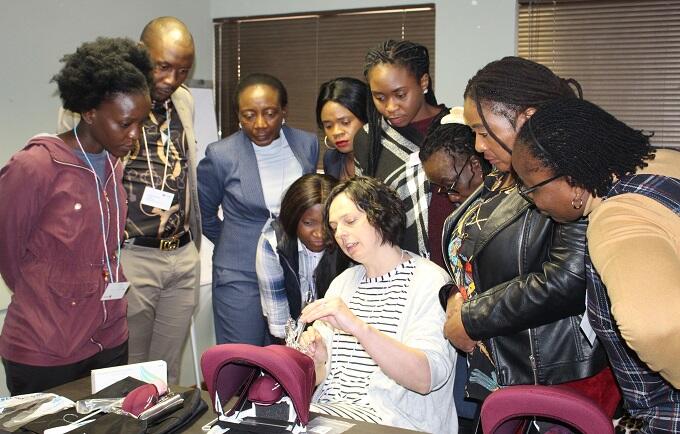WINDHOEK, Namibia - The first-ever Namibia Women’s Health Conference identified action areas to advance the goals of the International Conference on Population and Development (ICPD) and the Sustainable Development Goals (SDGs), based on the recognition that strengthening health systems with women at the center is critical to achieving the 2030 Agenda for Sustainable Development.
The National Conference on Women’s Health themed: “Ensuring Quality Care for Our Women,” which convened from 24-25 July 2019 in Windhoek examined ways to improve women’s health and reduce Namibia’s maternal mortality and morbidity.
Although Namibia has made some remarkable progress in improving its health sector, maternal mortality remains high in the country, estimated at 385 deaths per 100,000 live births according to the 2013 Namibia Demographic and Health Survey (NDHS).
The underlying causes of maternal deaths are varied and include the lack of skilled personnel, as well as the long distances and delays in seeking care.
The Conference provided an opportunity for peer-to-peer exchange of information and experiences, and sought to stimulate action from stakeholders.
Addressing participants, the Minister of Health and Social Services Hon. Dr. Kalumbi Shangula stressed that no women should die while giving birth and urged service providers to ensure proper record keeping in the management of patients.
“Nothing is more regrettable than seeing a woman lose her life whilst in the process of giving birth,” he stated.
Deputy Minister of Mines and Energy, Hon. Kornelia Shilunga, whose healthcare background includes having been a midwife, emphasized that improvement in women's health requires more than just the efforts of the science and healthcare professions. “But long overdue societal action is needed to correct injustices to women,” she stated.
“The World Health Organization describes health as a state of complete physical, mental and social well-being and not merely the absence of disease or infirmity, those I deem necessary to speak about the most neglected part of women health, especially during their childbearing ages,” she stated
“This implies stronger focus on mental health conditions in the integrated delivery of services for maternal and child health. The need is not just felt in high income countries. In fact, some academic and public health institutions in low and middle income countries have already initiated integrated maternal mental health programmes,” she urged.
Meanwhile, Prof. Stephen Rulisa, an Obstetrician Gynecologist and academic from Rwanda, shared how the country reduced maternal mortality ratio by 75 per cent, from 1071 deaths per 100,000 in 2000 to 210 deaths per 100,000 in 2014/5. Amongst the prioritized measures the country undertook to curb its high maternal mortality ratio are the introduction of community health insurance for citizens, maternal audit committees in health facilities, training of community health care workers as well as increased government spending to health.
“Community health workers need to be empowered in order for them to provide quality and reliable maternal healthcare,” said Prof. Rulisa.
Prof Robert Pattinson, Director of the South African Medical Research Council's Maternal and Infant Health Care Strategies Unit in the Department of Obstetrics and Gynaecology at the University of Pretoria presented how they had set up the confidential enquiry in South Africa and lessons learned which were relevant to Namibia.
Dr. Muna Abdullah from the United Nations Population Fund (UNFPA) East and Southern Africa Regional Office presented the results of the sub-Saharan Africa Maternal Perinatal Death Surveillance Review (MPDSR). The key obstacles indicated for Namibia were inadequate resources and quality of data analysis.
Registered midwife Hilma Shikwambi presented the importance of respectful midwifery care and how it is essential to improve maternity outcomes. “Women often avoid healthcare facilities because of abuse, neglect and coercion,” she told the meeting.
The Safe Childbirth Checklist, which was introduced in the small Namibian town of Gobabis, has lived up to expectations of being a reliable tool to improve maternal healthcare according to Dr. Leonard Kabongo, Chief Medical Officer for Omaheke Region, who presented its positive results to the audience.
The participants committed themselves and their organizations to continued contribution to improving women’s health in Namibia.
The conference, first of its kind depicted a collaborative relation among partners, particularly public-private partnership as a way to expand access to higher quality services.
The conference was organized by the Obstetrics and Gynaecology Department of the University of Namibia in collaboration with the Ministry of Health and Social Services, UNFPA, World Health Organization, European Union, NamPower Foundation, Bank Windhoek and MediClinic.
By Emma Mbekele


